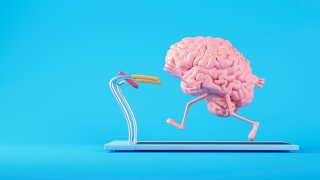
A study published Monday by scientists at UC San Diego School of Medicine adds to existing research linking physical activity with cognition -- using 90 middle-aged and older subjects who wore accelerometers while physically active and completed mobile cognitive testing from home.
"The future of lifestyle interventions really needs to be remote-based," said Raeanne Moore, associate professor in the Department of Psychiatry at UCSD School of Medicine and principal investigator of the study. "The pandemic has made this especially clear."
UCSD Studies
According to the study's findings, on the days their physical activity increased, the 50- to 74-year-old participants performed more effectively on an executive function task. Conversely, on the days when their physical activity decreased, so too did their cognitive performance.
Get top local stories in San Diego delivered to you every morning. Sign up for NBC San Diego's News Headlines newsletter.
The findings were published Monday in the journal JMIR mHealth and uHealth.
"It was a very linear relationship," Moore said. "We hypothesized that we would find this, but we couldn't be sure because we weren't telling people to increase their physical activity. They just did what they do every day."
Even after adjustments were made for factors such as HIV status, age, sex, education and race/ethnicity, the correlation between physical activity and cognition remained.
Though it didn't fall within the purview of this study, Moore speculated that, because functionally independent adults likely perform more cognitively stimulating and social activities, which are known to have positive impacts on brain health, physical activity may have less of an impact on cognition. However, those with Alzheimer's disease and related dementia saw a significant positive correlation.
"For them, physical activity may have a greater benefit on daily, real-world cognitive performance," Moore said.
Moore and first author Zvinka Zlatar, a clinical psychologist at UCSD School of Medicine, said their work has implications for the development of novel digital health interventions to preserve brain health in aging.
"We don't know yet if there's a cumulative, long-term effect to these small daily fluctuations in cognition," Zlatar said. "That's something we plan to study next -- to see if performing physical activity at different intensities over time, in unsupervised settings, can produce long-term improvements in brain health and sustained behavior change."



